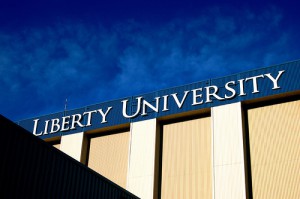What Really Happens at Liberty University: Part 3 (The End of Faith)

The first time I had come to Liberty University, I was attending one of the “College for a Weekend” events, where high school students get a Thursday through Sunday experience of LU—going to classes and convocation, eating at the dining hall, staying in the dorms.
I spotted Jerry Falwell at a football game, eating a hot dog by the concession stand. I approached him and told him of my interest in attending the greatest university God had ever built.
He shook my hand, leaned forward and said in the deep, rough voice of a southern good ol’ boy, “What’s your name, son?”
I was as star struck as a fangirl at an indie rock show. I mean, come on. He had exposed the homosexual agenda by outing Tinky Winky, the purse-totting, triangle-emblazoned Teletubby. The man was seriously accomplished. I spoke with reverence, spelling out ‘Cotelesse’ so he would get it right.
“I’ll look for your name in the fall.” Still gripping my hand, he shoved a meaty fist into my gut and laughed. I had never been so honored.
That is how I was welcomed into the Liberty family. It really can be a warm and inviting place. People there are willing to help you move in and out. They share. Most of the people on my hall would have placed each other somewhere on the friendship spectrum. I haven’t seen anything like it anywhere else among the three universities and one community college I have attended.
The good vibes are largely the result of Jesus’ command to “love thy neighbor” but also the natural consequences of a shared worldview. Sure, you may disagree on whether Hebrews 6:4-6 means someone can lose his or her salvation, but the only way to believe is Christian, and the only way to vote is Republican.
And Jerry was like the Pope to these people. He would address the entire campus during Wednesday convocation with the most absurd statements, and everyone would nod like zombies or root and cheer like chimpanzees.
My first semester at Liberty was the fall of 2001. Jerry blamed the September 11 attacks on feminists, secularists and homosexuals, saying God had “lift[ed] the curtain and allow[ed] the enemies of America to give us what we probably deserve.” After public criticism, he clarified that everyone’s sin had contributed to the tragedy. Even with my faith in Jesus fully intact I found it hard to believe God would make it easier for terrorists to kill innocent people.
I was particularly impressed with the tremendous, pendulum-swinging testicles necessary to say that people are incapable of destroying the Earth. Regardless of what you think about anthropogenic climate change, humankind has created enough nuclear weapons, poisons, and all around evil stuff to make our world uninhabitable for anything but cockroaches and amoebae.
But no one spoke a word against him. My own criticisms were met with furrowed brows and questions about my faith.
During my second semester, someone had distributed a self-published anti-evangelical book on campus. They were everywhere. Boxes of them were left outside of the dorms. They were waiting for students on the desks of empty classrooms. They were even bestowed upon the prayer chapel for those seeking inspiration.
Within hours, word came down the mountain that we were forbidden to read or own the unauthorized material. All the copies were whisked away, except for the one I had stashed in my underwear drawer.
It was libelous, inflammatory, and poorly-written. It said that televangelists were frauds who preyed on the vulnerable. It supported abortion and rebuked American support of Israel. Its premises were contrary to the doctrines of Liberty University, but the purpose of education should be to expose young minds to new ideas, not shield them.
This wasn’t what I had signed up for. I enrolled to be a part of a great tradition, to grow in my understanding of God and his purpose for me. I came seeking truth and righteousness, but found repression. By the end of my second year I had rejected almost all of the principles that had brought me to Liberty.
On my last day, I was thinking, “What now?” I no longer had any purpose or direction. I packed my belongings into my car. I exchanged hugs and handshakes with good friends I knew I would never see again. When my life would get dark over the next few years, I would remember the laughs and high-fives we shared to replace the uncertainty.
I remember it like a movie where the hero rides off into the sunset finishing one adventure and starting another, one burden lifted and another taken up. It was scary and a little bit exciting as all new things are but—for better or for worse—my life was now my own.
